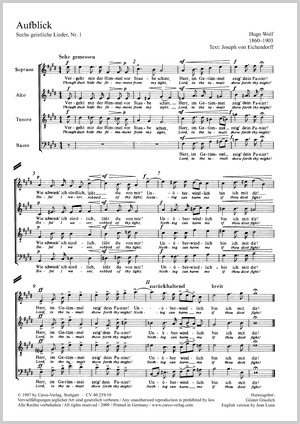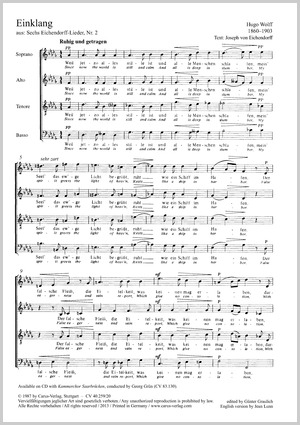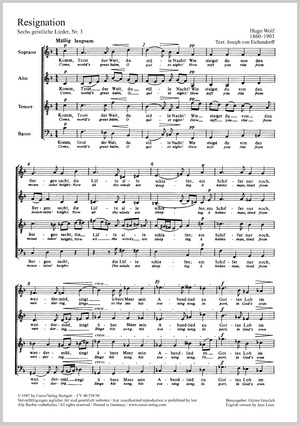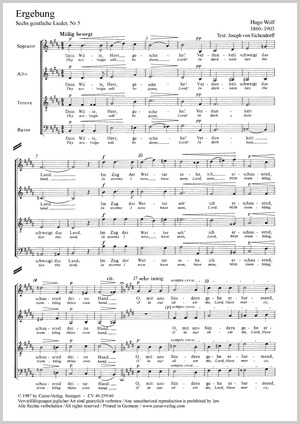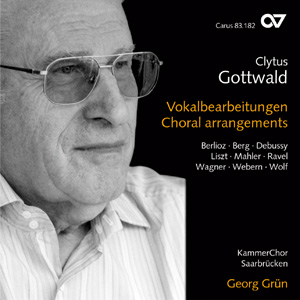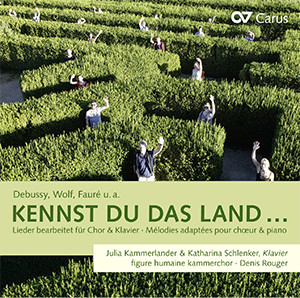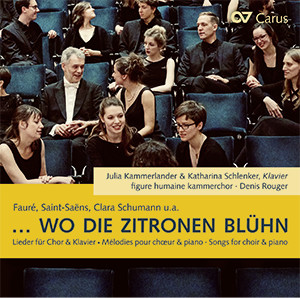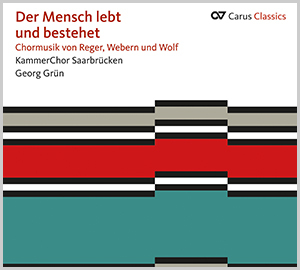
Der Mensch lebt und bestehet. Chormusik von Reger, Webern und Wolf (Carus Classics)
 Listen
(19)
Listen
(19)
- A man can live and flourish
- Thou highest light, day without end
- The night advances
- And to our blessed lady
- In God's great name we go our way
- Lamb of God
- With God's own help, we go to war
- Our faith is in one true God
- O death, how bitter are you
- Though dust hide the firmament from my sight
- Since now the word is still and calm
- Resignation
- Like a hero sorely wounded
- Thy sov'reign will be done
- Now let the waves breaks boldly up
- Im stillen Friedhof
- Grablied
- Gottvertrauen
- Entfliehet auf leichten Kähnen
 Additional material
Additional material
-
 text (without music) for download, html file, Singing text, english translationhtml file, Singing text, english translation (Sample)
text (without music) for download, html file, Singing text, english translationhtml file, Singing text, english translation (Sample)Der Mensch lebt und bestehet nur eine kleine Zeit A man can live and flourish for but a little time,
and all the world must perish with all its pomp and fame.
One only is eternal and beyond all motion, and we are his possession.Matthias Claudius
Translation: Jean Lunn...
-
 text (without music) for download, html file, Singing text, originalhtml file, Singing text, original (Sample)
text (without music) for download, html file, Singing text, originalhtml file, Singing text, original (Sample)Der Mensch lebt und bestehet nur eine kleine Zeit Der Mensch lebt und bestehet nur eine kleine Zeit,
und alle Welt vergehet mit ihrer Herrlichkeit.
Es ist nur Einer ewig und an allen Enden
und wir in seinen Händen.Matthias Claudius
...
-
 text (without music) for download, html file, Introductory text, Englishhtml file, Introductory text, English (Sample)Text from the CD Carus 83.326
text (without music) for download, html file, Introductory text, Englishhtml file, Introductory text, English (Sample)Text from the CD Carus 83.326Jürgen Schaarwächter
Translation (abridged): Elizabeth RobinsonMax Reger grew up as a Catholic in the Upper Palatinate and described himself as “Catholic to his fingertips.” By 1907, when he was appointed composition professor at the Leipzig Conservatory, he had become aware of the quality of the corpus of Protestant chorales. Adalbert Lindner reported Reger’s remark of 1898; “the Protestants don’t know what they have, with their chorales!” Reger had already come into close contact with the chorale at an early age. His friendship with the Protestant organist Karl Straube was exceptionally important in the following period, and when Reger married the divorced Protestant Elsa von Bercken in 1902, his break with the Catholic church was complete. Through Straube’s influence, Reger composed many works for use in the Protestant church, particularly in his time in Weiden
...
-
 text (without music) for download, html file, Introductory text, Germanhtml file, Introductory text, German (Sample)Booklet-Text der CD Carus 83.326
text (without music) for download, html file, Introductory text, Germanhtml file, Introductory text, German (Sample)Booklet-Text der CD Carus 83.326Jürgen Schaarwächter
Als Max Reger 1907 seine Kompositionsprofessur am Leipziger Konservatorium antrat, war aus dem in der Oberpfalz aufgewachsenen Katholiken, der sich selbst als „katholisch bis in die Fingerspitzen“ bezeichnete, ein um die Qualität der protestantischen Choräle Bewusster geworden: Adalbert Lindner berichtet von Regers Ausspruch aus dem Jahr 1898 „Die Protestanten wissen nicht, was sie an ihrem Chorale haben!“ Schon in jungen Jahren war Reger mit dem Choral in engen Kontakt gekommen – als Suborganist der Weidener Pfarrkirche St. Michael, die von beiden Konfessionen genutzt wurde. Die Freundschaft zu dem – protestantischen – Organisten Karl Straube muss in der Folgezeit als von herausragender Bedeutung bezeichnet werden, und als Reger 1902 die geschiedene Protestantin
...
-
 text (without music) for download, html file, Singing text, english translationhtml file, Singing text, english translation (Sample)
text (without music) for download, html file, Singing text, english translationhtml file, Singing text, english translation (Sample)Morgengesang Thou highest light, day without end,
thou God and my most faithful Lord,
from thee the light of grace goes forth
and brightly shines for all the earth.
This is our Saviour Jesus Christ,
for he is God’s own truth most blest,
and his gospel’s light glows sublime
until he draws all hearts to him.
He is the light of all the world,
in whom men clearly may behold
the bright and beauteous light of day
that brings them blessing and all joy.Johannes Zwick
Translation: Jean Lunn...
-
 text (without music) for download, html file, Singing text, originalhtml file, Singing text, original (Sample)
text (without music) for download, html file, Singing text, originalhtml file, Singing text, original (Sample)Morgengesang Du höchstes Licht, ewiger Schein,
du Gott und treuer Herre mein,
von dir der Gnaden Glanz ausgaht
und leuchtet schön gleich früh und spat.
Das ist der Herre Jesus Christ,
der ja die göttlich Wahrheit ist,
der mit sein’r Lehr hell scheint und leucht’,
bis er die Herzen zu sich zeucht.
Er ist der ganzen Welte Licht,
stellt jedem vor sein Angesicht
den hellen, schönen, lichten Tag,
an dem er selig werden mag.Johannes Zwick
...
-
 text (without music) for download, html file, Introductory text, Englishhtml file, Introductory text, English (Sample)Text from the CD Carus 83.326
text (without music) for download, html file, Introductory text, Englishhtml file, Introductory text, English (Sample)Text from the CD Carus 83.326Jürgen Schaarwächter
Translation (abridged): Elizabeth RobinsonMax Reger grew up as a Catholic in the Upper Palatinate and described himself as “Catholic to his fingertips.” By 1907, when he was appointed composition professor at the Leipzig Conservatory, he had become aware of the quality of the corpus of Protestant chorales. Adalbert Lindner reported Reger’s remark of 1898; “the Protestants don’t know what they have, with their chorales!” Reger had already come into close contact with the chorale at an early age. His friendship with the Protestant organist Karl Straube was exceptionally important in the following period, and when Reger married the divorced Protestant Elsa von Bercken in 1902, his break with the Catholic church was complete. Through Straube’s influence, Reger composed many works for use in the Protestant church, particularly in his time in Weiden
...
-
 text (without music) for download, html file, Introductory text, Germanhtml file, Introductory text, German (Sample)Booklet-Text der CD Carus 83.326
text (without music) for download, html file, Introductory text, Germanhtml file, Introductory text, German (Sample)Booklet-Text der CD Carus 83.326Jürgen Schaarwächter
Als Max Reger 1907 seine Kompositionsprofessur am Leipziger Konservatorium antrat, war aus dem in der Oberpfalz aufgewachsenen Katholiken, der sich selbst als „katholisch bis in die Fingerspitzen“ bezeichnete, ein um die Qualität der protestantischen Choräle Bewusster geworden: Adalbert Lindner berichtet von Regers Ausspruch aus dem Jahr 1898 „Die Protestanten wissen nicht, was sie an ihrem Chorale haben!“ Schon in jungen Jahren war Reger mit dem Choral in engen Kontakt gekommen – als Suborganist der Weidener Pfarrkirche St. Michael, die von beiden Konfessionen genutzt wurde. Die Freundschaft zu dem – protestantischen – Organisten Karl Straube muss in der Folgezeit als von herausragender Bedeutung bezeichnet werden, und als Reger 1902 die geschiedene Protestantin
...
-
 text (without music) for download, html file, Singing text, english translationhtml file, Singing text, english translation (Sample)
text (without music) for download, html file, Singing text, english translationhtml file, Singing text, english translation (Sample)Unser lieben Frauen Traum And to our blessed lady
there came a dream one day,
that there beneath her bosom
there lived and grew a great tree.
And as the tree gave shadows,
even over every land,
Lord Jesus Christ, the Saviour,
just so has he been named.
Lord Jesus Christ, the Saviour,
he is our help indeed,
and by his bitter passion
he has redeemed the world.Anonymus
Translation: Jean Lunn...
-
 text (without music) for download, html file, Singing text, originalhtml file, Singing text, original (Sample)
text (without music) for download, html file, Singing text, originalhtml file, Singing text, original (Sample)Unser lieben Frauen Traum Und unser lieben Frauen,
der traumet ihr ein Traum:
wie unter ihrem Herzen
gewachsen wär ein Baum.
Und wie der Baum ein Schatten gäb
wohl über alle Land:
Herr Jesus Christ, der Heiland,
also ist er genannt.
Herr Jesus Christ, der Heiland
ist unser Heil und Trost,
mit seiner bittern Marter
hat er uns all erlöst.Anonymus
...
-
 text (without music) for download, html file, Introductory text, Englishhtml file, Introductory text, English (Sample)Text from the CD Carus 83.326
text (without music) for download, html file, Introductory text, Englishhtml file, Introductory text, English (Sample)Text from the CD Carus 83.326Jürgen Schaarwächter
Translation (abridged): Elizabeth RobinsonMax Reger grew up as a Catholic in the Upper Palatinate and described himself as “Catholic to his fingertips.” By 1907, when he was appointed composition professor at the Leipzig Conservatory, he had become aware of the quality of the corpus of Protestant chorales. Adalbert Lindner reported Reger’s remark of 1898; “the Protestants don’t know what they have, with their chorales!” Reger had already come into close contact with the chorale at an early age. His friendship with the Protestant organist Karl Straube was exceptionally important in the following period, and when Reger married the divorced Protestant Elsa von Bercken in 1902, his break with the Catholic church was complete. Through Straube’s influence, Reger composed many works for use in the Protestant church, particularly in his time in Weiden
...
-
 text (without music) for download, html file, Introductory text, Germanhtml file, Introductory text, German (Sample)Booklet-Text der CD Carus 83.326
text (without music) for download, html file, Introductory text, Germanhtml file, Introductory text, German (Sample)Booklet-Text der CD Carus 83.326Jürgen Schaarwächter
Als Max Reger 1907 seine Kompositionsprofessur am Leipziger Konservatorium antrat, war aus dem in der Oberpfalz aufgewachsenen Katholiken, der sich selbst als „katholisch bis in die Fingerspitzen“ bezeichnete, ein um die Qualität der protestantischen Choräle Bewusster geworden: Adalbert Lindner berichtet von Regers Ausspruch aus dem Jahr 1898 „Die Protestanten wissen nicht, was sie an ihrem Chorale haben!“ Schon in jungen Jahren war Reger mit dem Choral in engen Kontakt gekommen – als Suborganist der Weidener Pfarrkirche St. Michael, die von beiden Konfessionen genutzt wurde. Die Freundschaft zu dem – protestantischen – Organisten Karl Straube muss in der Folgezeit als von herausragender Bedeutung bezeichnet werden, und als Reger 1902 die geschiedene Protestantin
...
Contents
-
Preface writer
Georg Grün
Georg Grün studied church music, school music, Catholic theology, musicology, and conducting, and he taught music and courses on the Catholic religion for several years at a lycée for the arts. In 2000 he was appointed Professor of choral conducting at the Staatliche Hochschule für Musik und Darstellende Kunst Mannheim. He has also been very success ful as a conductor of the chamber choir at this school (it has won prizes at the choral competitions of Cork and Maribor). Grün is active both at home and abroad as a guest conductor, juror and lecturer. In October 2012 Georg Grün was appointed Professor for Choral Conducting at the Hochschule für Musik Saar. Personal details
-
Ensemble
KammerChor Saarbrücken
The KammerChor Saarbrücken, founded in 1990 by its conductor Georg Grün, quickly developed into one of the best choirs in Germany and likewise enjoys an outstanding international reputation. This has been confirmed through countless appear ances in Germany, in many European countries, the USA and Russia, CDs which have received critical acclaim, numerous radio record ings, and last, but not least, by the many prizes which the choir has won at international choral competitions and at the German choral competition in Regensburg in 1998. The choir performs works from all historical eras. In the field of early music it collaborates with professional ensembles and soloists who are dedicated to historical performance practice. Additional themes in its repertoire include the performance of romantic choral music, as well as an increasing number of world premiere performances of works written by composers exclusively for the ensemble. Personal details
-
Conductor
Georg Grün
Georg Grün studied church music, school music, Catholic theology, musicology, and conducting, and he taught music and courses on the Catholic religion for several years at a lycée for the arts. In 2000 he was appointed Professor of choral conducting at the Staatliche Hochschule für Musik und Darstellende Kunst Mannheim. He has also been very success ful as a conductor of the chamber choir at this school (it has won prizes at the choral competitions of Cork and Maribor). Grün is active both at home and abroad as a guest conductor, juror and lecturer. In October 2012 Georg Grün was appointed Professor for Choral Conducting at the Hochschule für Musik Saar. Personal details
Reviews on our website can only be submitted by customers with a registered user account. A check whether the rated products were actually purchased does not take place.
Frequent questions about this work
 There are no questions and answers available so far or you were unable to find an answer to your specific question about this work? Then click here and send your specific questions to our Customer Services!
There are no questions and answers available so far or you were unable to find an answer to your specific question about this work? Then click here and send your specific questions to our Customer Services!



